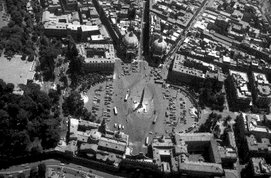CHICAGO/NEW YORK (Reuters) - When it opens next year, the 54-story Bank of America Tower in New York will be the most environmentally friendly office building in the United States.
The building is the latest in a trend toward office buildings that use less energy and cause less global warming. But developers say that trend is being held back by insufficient government support.
Seventeen U.S. states and 59 cities including New York and Chicago offer incentives for green buildings or require certification under the Leadership in Energy and Environmental Design (LEED).
That, and demand from tenants, has led to a boom in green buildings, said Rick Fedrizzi, founder of the U.S. Green Building Council, a nonprofit group that issues the LEED certification.
Five years ago, it was hard to get developers to focus on environmentally friendly building. "Now, I get three calls a day from CFOs asking about what we do," Fedrizzi said. The council's green building rating system has gone from relative obscurity to a mark of prestige.
The Bank of America building in Midtown Manhattan, with 2.1 million square feet and six trading floors, will be the first building to earn a platinum LEED certificate, the council's highest.
But without $650 million in bonds intended to rebuild Lower Manhattan after the attacks of September 11, 2001, it may not have been built.
Jeffrey Schwartz, chief executive of ProLogis -- the world's largest developer, said the U.S. government is not doing enough to help green buildings.
"It's not cost efficient without (government) sponsorship today," Schwartz said.
The U.S. Environmental Protection Agency
argues that federal tax breaks of up to $1.80 per square foot and programs to promote energy conservation provide enough support."This is often not a cost-efficient process," said Herb Hauser, a consultant at Midtown Technologies. "More financial incentives would help."
Hauser is working on the $1.5 billion Steel Point mixed-use development in Bridgeport, Connecticut, that will generate 15 percent of its own power using wind, water and solar energy.
HIGH ENERGY PRICES
Green projects have grown rapidly in recent years. The U.S. Green Building Council has issued 546 LEED certificates covering 59 million square feet, up from 38 covering 5 million square feet in 2002.
For its part, the Environmental Protection Agency gave its Energy Star label, more commonly given to energy efficient appliances, to 930 buildings last year. It has certified 3,200 since 1992.
"Until recently energy policy in this country came down to praying for a warm winter," said Hauser.
Work on Steel Point will begin in the third quarter of this year and the first phase should go into operation within two years.
But developers say social pressure also plays a part, making green offices a must for a growing number of companies.
"Some companies have concluded they can use a greener building as a recruitment and market tool," said Brad Soderwall, project manager for privately-owned Houston-based developer Hines for a 60-story $450 million office building in downtown Chicago.
The building will be gold LEED certified, thanks to items such as pumping river water over water pipes in the basement to cool the building instead of a using a conventional rooftop cooling system. It will also have a green roof -- covered with plants to improve air quality, conserve energy and reduce runoff.
"Having a greener, more energy efficient place to work is important to a surprising number of people," he said.
Hines expects these measures will save $800,000 annually on energy bills. The main tenant, Chicago-based law firm Kirkland & Ellis LLP, required a gold LEED certificate in the lease.
Erik Olsen, Chicago's green projects administrator, said the city fast-tracks green projects, cutting permitting time in half and mandatory consulting fees by up to $25,000.
Dale Anne Reiss, global real estate director for accounting firm Ernst & Young, predicted that failure to go green could lower the value of conventional buildings.
"You could have impairment on your buildings that are not green," Reiss said.
http://news.yahoo.com/s/nm/20070214/us_nm/feature_climate_dc_3


No comments:
Post a Comment